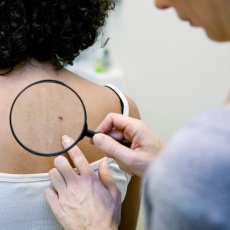

National Institutes of Health
Other Languages
Skin Cancer Detection and Prevention
Skin cancer is the most common type of cancer in the United States. Most skin cancers are caused by too much exposure to ultraviolet (UV) rays from the sun or from man-made sources. You don’t need x-rays or blood tests to find skin cancer early – just your eyes and a mirror. If you have skin cancer, finding it early is the best way to make sure it can be treated with success.
Skin cancer is the most common form of cancer in the United States. The two most common types are basal cell cancer and squamous cell cancer. They usually form on the head, face, neck, hands, and arms. Another type of skin cancer, melanoma, is more dangerous but less common.
Anyone can get skin cancer, but it is more common in people who
- Spend a lot of time in the sun or have been sunburned
- Have light-colored skin, hair and eyes
- Have a family member with skin cancer
- Are over age 50
You should have your doctor check any suspicious skin markings and any changes in the way your skin looks. Treatment is more likely to work well when cancer is found early. If not treated, some types of skin cancer cells can spread to other tissues and organs. Treatments include surgery, radiation therapy, chemotherapy, photodynamic therapy (PDT), and biologic therapy. PDT uses a drug and a type of laser light to kill cancer cells. Biologic therapy boosts your body's own ability to fight cancer.
NIH: National Cancer Institute
- How Are Squamous and Basal Cell Skin Cancers Diagnosed? (American Cancer Society)Also in Spanish
- Skin Biopsy (Logical Images)
- Skin Cancer Screening
 (National Library of Medicine)Also in Spanish
(National Library of Medicine)Also in Spanish - Skin Cancer Screening
 (National Cancer Institute)Also in Spanish
(National Cancer Institute)Also in Spanish - Stages of Merkel Cell Carcinoma
 (National Cancer Institute)
(National Cancer Institute) - Stages of Skin Cancer
 (National Cancer Institute)Also in Spanish
(National Cancer Institute)Also in Spanish
- Behavioral Counseling to Prevent Skin Cancer (U.S. Preventive Services Task Force) - PDF
- Skin Cancer Prevention
 (National Cancer Institute)Also in Spanish
(National Cancer Institute)Also in Spanish - Surgeon General's Call to Action to Prevent Skin Cancer(Centers for Disease Control and Prevention, Surgeon General)
- Cryosurgery in Cancer Treatment: Questions and Answers
 (National Cancer Institute)
(National Cancer Institute) - Drugs Approved for Skin Cancer
 (National Cancer Institute)
(National Cancer Institute) - Electrodesiccation (Logical Images)
- Mohs Micrographic Surgery (Logical Images)
- Skin Cancer Treatment
 (National Cancer Institute)
(National Cancer Institute) - Skin Cancer: Treatment Types (American Society for Radiation Oncology)
- Treatment Option Overview (Merkel Cell Carcinoma)
 (National Cancer Institute)
(National Cancer Institute) - Treatment Options by Stage (Merkel Cell Carcinoma)
 (National Cancer Institute)
(National Cancer Institute) - Treatment Options for Actinic Keratosis
 (National Cancer Institute)
(National Cancer Institute) - Treatment Options for Nonmelanoma Skin Cancer
 (National Cancer Institute)
(National Cancer Institute)
- What Will Happen After Treatment for Basal and Squamous Cell Skin Cancers?(American Cancer Society)Also in Spanish
- Actinic Cheilitis (Logical Images)
- Actinic Keratosis (Solar Keratosis) (Logical Images)
- Anyone Can Get Skin Cancer
 (National Cancer Institute) - PDFAlso in Spanish
(National Cancer Institute) - PDFAlso in Spanish - Risks of Skin Cancer Screening
 (National Cancer Institute)Also in Spanish
(National Cancer Institute)Also in Spanish - Sunscreen: How to Help Protect Your Skin from the Sun (Food and Drug Administration)
- Sunscreens FAQs (American Academy of Dermatology)
- Basal Cell Carcinoma (American Academy of Dermatology)
- Dermatofibrosarcoma Protuberans (DFSP) (American Academy of Dermatology)
- Eyelid Cancer (American Society of Clinical Oncology)
- General Information about Merkel Cell Carcinoma
 (National Cancer Institute)Also in Spanish
(National Cancer Institute)Also in Spanish - Merkel Cell Carcinoma (American Academy of Dermatology)
- Nevoid Basal Cell Carcinoma Syndrome (American Society of Clinical Oncology)
- Sebaceous Carcinoma (American Academy of Dermatology)
- Skin Cancer of the Hand and Upper Extremity (American Society for Surgery of the Hand)
- Skin Cancers of the Feet (American Podiatric Medical Association)
- Squamous Cell Carcinoma (American Academy of Dermatology)
- Genetics Home Reference: 9q22.3 microdeletion
 (National Library of Medicine)
(National Library of Medicine) - Genetics Home Reference: Gorlin syndrome
 (National Library of Medicine)
(National Library of Medicine) - Genetics Home Reference: xeroderma pigmentosum
 (National Library of Medicine)
(National Library of Medicine) - Learning about Skin Cancer
 (National Human Genome Research Institute)
(National Human Genome Research Institute)
- Squamous Cell Carcinoma (SCC) (Logical Images)
- "Suntelligence" Survey (American Academy of Dermatology)
- For Some Skin Cancers, Targeted Drug Hits the Mark
 (National Cancer Institute)
(National Cancer Institute) - Skin Cancer (American Academy of Dermatology)
- Skin Cancer Trends (Centers for Disease Control and Prevention)Also in Spanish
- What's New in Research and Treatment of Basal and Squamous Cell Skin Cancers?(American Cancer Society)Also in Spanish
- ClinicalTrials.gov: Carcinoma, Basal Cell
 (National Institutes of Health)
(National Institutes of Health) - ClinicalTrials.gov: Carcinoma, Merkel Cell
 (National Institutes of Health)
(National Institutes of Health) - ClinicalTrials.gov: Keratosis, Actinic
 (National Institutes of Health)
(National Institutes of Health) - ClinicalTrials.gov: Skin Neoplasms
 (National Institutes of Health)
(National Institutes of Health)
- Dictionary of Cancer Terms
 (National Cancer Institute)Also in Spanish
(National Cancer Institute)Also in Spanish
- American Academy of Dermatology
- American Cancer Society
- Find a Cancer Doctor (American Society of Clinical Oncology)
- Find a Dermatologic Surgeon (American Society for Dermatologic Surgery)
- Find a Dermatologist (American Academy of Dermatology)
- National Cancer Institute
 Also in Spanish
Also in Spanish - Organizations That Offer Support Services
 (National Cancer Institute)Also in Spanish
(National Cancer Institute)Also in Spanish
- Basal cell carcinoma (Medical Encyclopedia)Also in Spanish
- Mohs micrographic surgery (Medical Encyclopedia)Also in Spanish
- Skin lesion biopsy (Medical Encyclopedia)Also in Spanish
- Skin self-exam (Medical Encyclopedia)Also in Spanish
- Squamous cell skin cancer (Medical Encyclopedia)Also in Spanish





















.png)












No hay comentarios:
Publicar un comentario